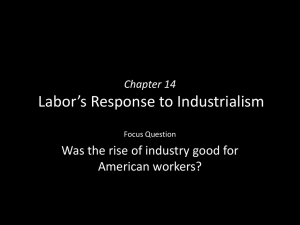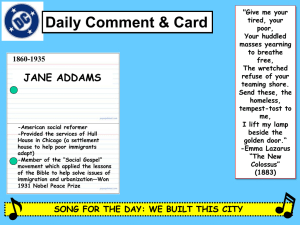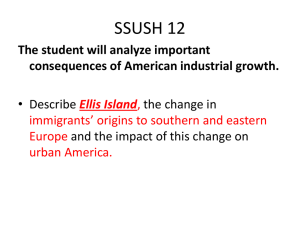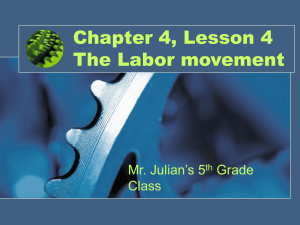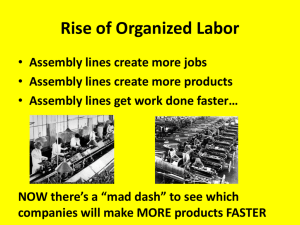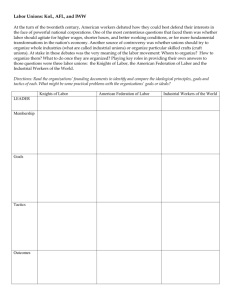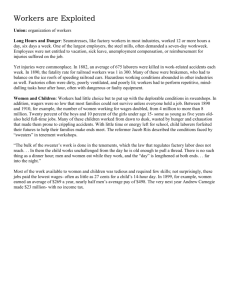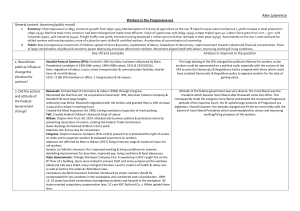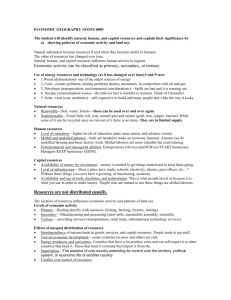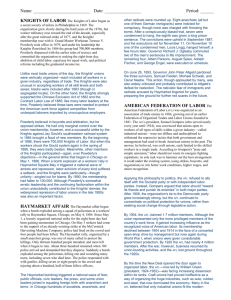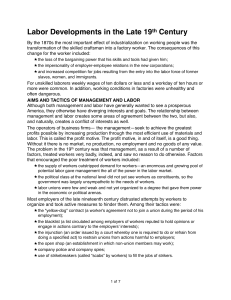Birth of Unions PowerPoint
advertisement
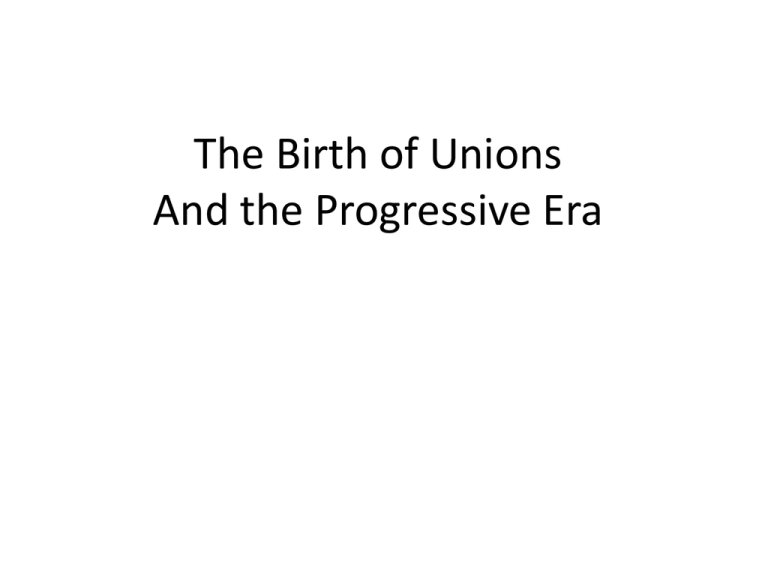
The Birth of Unions And the Progressive Era The American Federation of Labor Different groups of skilled workers (craftsman) had formed small labor unions during the 1800’s, but the first large successful union was the American Federation of Labor Skilled Craftsmen Only The AFL was founded in Ohio, 1886. It was an organization bringing together smaller craft unions. Focusing on crafts, meant that only skilled workers and their unions could join. In addition to not allowing unskilled workers, women and African Americans were also banned from the AFL. Sam Gompers Samuel Gompers, a reader, from the Cigar Makers International Union was elected president of the AFL each year from 1886 to 1924 with the exception of 1894. Gompers was an English-born immigrant. His family was Jewish and was impoverished. Gompers had to leave school at age 10, but continued his education in night school. Business Unionism and Political Action Gompers did not want the the AFL to be associated with socialism and emphasized the role of skilled workers in maximizing the profits of industry. Cigar Makers Affiliate Certificate He also believed that the union should not be tied to any one political party but he encouraged union members to “reward their friends and punish their enemies” at the polls (In time, however, the AFL would associate closely with the Democratic party). Law and Union Activity During Gomper’s time in the AFL, the courts and the laws generally favored business interests over those of the workers. In many areas picketing was outlawed. Iron-clad contracts were legal where an employer made an employee sign an oath that he would never join a union. Anti-trust laws were even used to attack unions (The Sherman Act). The Industrial Workers of the World The IWW, or “The Wobblies” was formed in 1905 in Chicago at a convention of socialists and radicals. The Wobblies took a very different view of unionization. A Socialist View The IWW took a socialist view of labor. They felt that the AFL was too pro-business. They sought a business model where the workers would manage themselves. Capitalism was considered the source of the worker’s problems. Unskilled Labor They looked to organize by industry instead of craft. This meant that unskilled workers would be in a labor union along with their skilled co-workers. The AFL would eventually bring in unskilled labor, but not until the 1940’s. The IWW grew to its largest shortly after WWI. However, the fear of socialism and radical anarchists that developed during the post-war years made the IWW less popular. Membership declined drastically in the 1920’s. The Closed Shop A closed shop is a term used for any firm that only hires union members. This meant that craft union members would be offered work exclusively. This made sense because most craftsmen were in a union, and in order to learn the craft, one usually had to work as an apprentice under a master craftsmen. Closed Shops Help Unions Grow As unions grew, organized labor won closedshop status within many industries. This became such a concern that closed shops were outlawed in 1947 by the Taft-Hartley Act. While closed shops are now illegal, union shops are not. A union shop requires employees to join a union within a certain amount of time AFTER being hired. However, some states have enacted “Right to Work” laws that make even union shops illegal. In these states all employees have the right to NOT join a union. The Populist Party The People’s Party (The Populists) was not a union. It was a political party. Like some of the poor skilled workers in the nation’s cities, poor farmers also wanted to create something that would give them some power over their fate. From 1891 to 1908, the People’s Party existed for that purpose. Poor white cotton farmers from the South and wheat farmers from the plain’s states were tired of being taken advantage of by other business interests. These poor farmers were unable to get loans at reasonable rates from banks. The banks favored larger farms and the larger farms did not want any new competition. Likewise, these poor farmers felt put out by the railroads. Railroads would give better rates to larger farms that shipped in larger quantities. This made it even more difficult for the small farms to compete. James B. Weaver (1892) The Populists wanted to see laws enacted that would regulate banks, railroads, and other industries. They felt that this would help level the playing field. The Populist’s often formed political agreement with the unions because both sides felt a need to stand up for themselves against the elites. However, as industry grew, the power of the small farmers became less and less significant. The populists would often join forces with one of the two major parties when it was to their interest, but this also led to fractures within the party.
